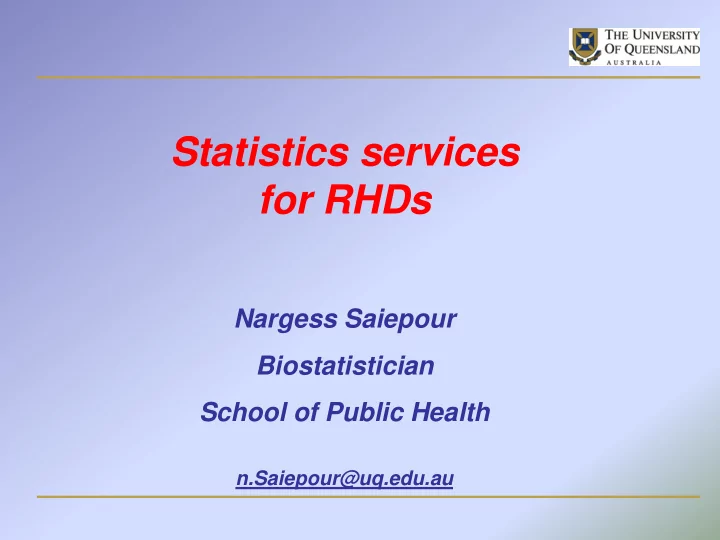

Statistics services for RHDs Nargess Saiepour Biostatistician School of Public Health n.Saiepour@uq.edu.au
what is statistics & why do we need it? Both a science and a part of the methodology for all sciences • Science of collecting, analysing, presenting and interpreting data • Objective evaluation of research questions of interest • Weigh up how much evidence the collected data provide for and against the research hypothesis of interest • Important role in medical research • Easy to use but difficult to use correctly
Stages of the research process: – Planning: • Study design • Sample size calculation – Data collection • Data management/ setting up a database – Data analysis Most common time to seek help – Dissemination • Thesis submission • Publication process • Responding to reviewer comments Another common time to seek help
Ronald Fisher: "To consult a statistician after an experiment is finished is often merely to ask him to conduct a post mortem examination. He can perhaps say what the experiment died of."
Statistical help? • Who? All medical researchers • When? At the beginning At the beginning At the beginning
The possible consequences of not obtaining early help • Waste of all resources: Sample size is too small to yield reliable results • Waste of some resources: Sample size that is larger than necessary to generate an acceptable level of accuracy • Telling a lie: Three kind of lies: Lies, damned lies, and statistics (Benjamin Disraeli) . • Causing a disaster: Challenger disaster: January 28, 1986
Challenger disaster: January 28, 1986
Exploded
Available statistical supports at SPH • Courses • Short coursed/ workshops • Consultancy
Courses • Data Management and Statistical Computing (STAT7603) (Semester 1 & 2 - External) • Introduction to Biostatistics (PUBH7630) (semester 1 & 2) • Practical Regression Analyses (PUBH7631) (semester 2) • Advanced Biostatistics & Epidemiology (PUBH7632) (Summer course – Nov to Dec 2016)
Course description • 2016 full course list of postgraduate courses: https://public-health.uq.edu.au/filething/get/2280/full-postgraduate- course-list.pdf • (STAT7603): https://www.uq.edu.au/study/course.html?course_code=STAT7603 • (PUBH7630): http://www.uq.edu.au/study/course.html?course_code=PUBH7630 • (PUBH7631): http://www.uq.edu.au/study/course.html?course_code=PUBH7631 • (PUBH7632): http://www.uq.edu.au/study/course.html?course_code=PUBH7632
Short courses Short courses: • STATA (Robert Ware) and • R and R studio (Peter Baker) • SPSS (Nargess Saiepour) yet to be announced Information on Statistical software packages (UCLA) SAS, STATA, SPSS and R/R studio & R commander The link: http://www.ats.ucla.edu/stat/
How to contact our consultants An initial consultation and statistical advice Fill in the appropriate “Request for Statistics Support” form available on SOM website (Research Support) Steps: • Download the statistics support application form http://www.som.uq.edu.au/research/school-of-medicine- research/research-office/research-support.aspx • Return the completed form to: research.office@som.uq.edu.au If unsure of your eligibility email the research office
Statistical information on UCLA webpage
Statistics support
What do we need to know about your study? • Background • Status • Aims/objectives/hypotheses • How much help needed? • What help needed? • When is it needed by?
Things to consider • Deadlines: “I need to present next week” • Overcomplicated studies: small sample size, too many variables • Timing of advice: coming at design stage having easier analysis stage • Me too publication: copy a method used in another published paper
• Messy data: searching for variables in the data set • Hand (2010): “ 90% of data analysis is data cleaning” • Unclear/vague projects: – Vague idea of research aims – Unclear about definitions of variables/ exactly which variables to analyse • Identifiable information: Sending data with names of participants
Help Help us to h us to help you elp you Th Thanks anks
Recommend
More recommend